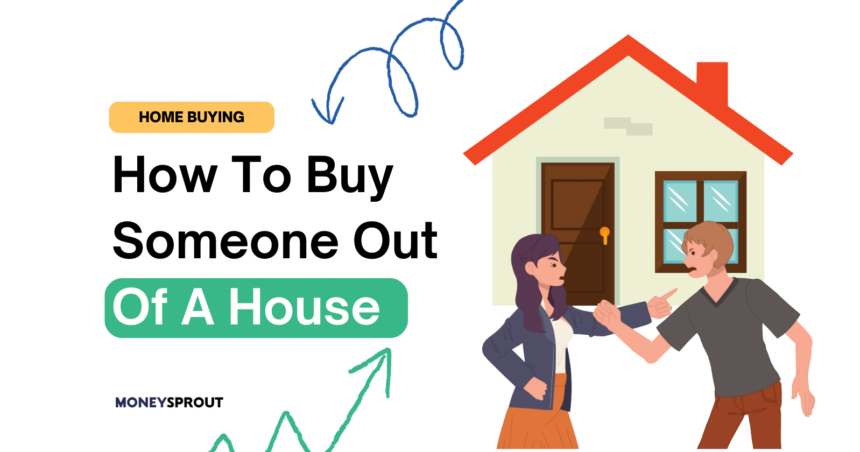Owning a property is an important milestone in your life. For most people, it creates a sense of stability, financial security, and an investment in the future.
However, relationships end and plans change and you might want to buy someone out of a house. Be warned though – the process isn’t the most straightforward.
That’s where this step-by-step guide comes in. We’ll dive into the nitty-gritty of buying someone out of a house, covering everything from negotiations, legal considerations, and the financial aspects involved. Let’s get started.
What Does Buying Someone Out of a House Mean?
First things first, let’s talk about what this process really means. Simply put, when you buy someone out of a house, you acquire that person’s ownership share in a property and become the sole owner.
This occurs when two or more individuals own a property together- – whether spouses, partners, siblings, or buddies – and one party wants to obtain the entire share held by the other party.
Common Reasons for Considering a Buyout in Property Co-ownership
Everyone’s situation is unique, and there can be many reasons why you may want to buy someone out of a house:
Divorce or Separation
Partners have decided to go separate ways, and one wants to keep the house.
Inheritance
Siblings inherit a property, and one wishes to buy the others out to gain full ownership.
Financial Reasons
One of the co-owners needs cash, and selling their share of the property is the only way to access the funds they require.
Changing Circumstances
Life circumstances change, and someone needs to move for a job, relationship, or any other personal reason.
Disagreements
Differences in lifestyle, the way of using the property, or maintenance responsibilities may lead to conflicts among co-owners, and buying out one party will resolve these issues.
Eight Essential Steps in Buying Someone Out of a Property
The steps to buying someone out of a house can vary depending on the specific circumstances and agreements made between the parties. Below, we’ve outlined all the key aspects to consider.
Step 1 – Assess Your Property’s Value
One of the first things to assess is what your home is worth right now, and that’s where property valuation comes in. You can check out recent sales of similar properties in your area (commonly referred to as price shopping or conducting a market analysis). However, we highly recommend hiring a qualified surveyor for an unbiased, accurate assessment.
Step 2 – Negotiate Terms
Before you seal the deal, both parties need to sit down and hash out the terms. This may include getting on the same page about the property’s value, the stake being sold, the buyout price, and any other relevant details. Be clear and thorough when defining these conditions to avoid any misunderstandings and disputes down the road.
There is one important proviso to always bear in mind during negotiations. Don’t forget to communicate openly and jot down all the points discussed. This way, you’re making sure nothing important is missed and you have a record of every part of the agreement.
Step 3 – Go Over Finances and Payment Structure
The parties must discuss the financial terms and decide on the payment structure for the buyout – an undeniably critical step. You’ve got different options to weigh up, like whether to make a quick one-and-done lump sum payment or distribute payments in instalments. It’s your call – pick the path that feels right for your wallet.
At this crucial stage of the negotiations, it’s prudent to involve an expert financial consultant to streamline this process. Organisations like Unbiased and Personal Finance Society can put you in touch with an accredited adviser.
Step 4 – Mortgage Considerations
If the property already has a mortgage in place, payment arrangements will need to be tackled. The parties involved must explore viable options, including the prospect of you taking over or refinancing the existing mortgage. Alternatively, you could just wipe the mortgage slate clean altogether.
If the property is mortgage-free, however, you might be thinking about getting one to fund the buyout. But keep in mind that getting approved will depend on your financial situation.
Just as importantly, don’t rush into things. Before jumping straight into a mortgage, make sure it’s really the right move for you and your loved ones. Check out the information provided in our other posts to help you feel more confident and informed. This way, you won’t regret your decision later down the line.
Step 5 – Seek Legal Advice
It’s crucial for both you and the other party to seek legal advice from qualified professionals before putting pen to paper on any agreements. You should have your own legal adviser to ensure your interests are protected and the whole transaction is legally sound.
Fortunately, you can find a good solicitor through The Law Society if you reside in England or Wales. If you’re on a low income, take advantage of the opportunity to ask questions and get free legal advice from volunteer solicitors here. Remember, these services don’t come cheap. Every bit of free advice could equate to significant savings in the short- to medium term.
Step 6 – Consider Costs & Fees
Both parties should be aware of their potential tax liabilities and associated costs and fees, including legal fees, surveyor fees, and whatever other relevant expenses might pop up. These costs can vary, so it’s key to plan ahead and factor this into the negotiation talks.
More crucially, a budget plan can go a long way to help prevent unpleasant financial surprises and ensure you have adequate resources to cover these expenses. Be proactive and make sure you’re prepared for any obstacles that might stand in your way.
Step 7 – Sealing the Deal
Now it’s time to go through the legal process of transferring ownership. This involves the preparation and signing of relevant documents and a legally binding agreement that outlines and formalises the agreed-upon terms, covering the purchase price, how the payments will roll out, and any other conditions both parties must meet.
Step 8 – Passing the Keys
Once all the legal and financial aspects are in order, that’s the green light to wrap things up – the deal is done, and you now officially own the place.
FAQs
How Long Does Buying Someone Out of a House Take?
The timeline for buying someone out of a house can vary significantly. While a smooth and amicable process could take up to six weeks, there are many moving parts that can extend the duration.
Agreement on Terms
If both you and the other party quickly come to an agreement on the terms of the buyout, the process can move smoothly. Having said that, curveballs can be thrown into the mix, especially if there are disagreements, that will potentially slow down the whole process.
The Complexity of Financial Arrangements
Securing a mortgage can be a time-consuming undertaking. If you hit roadblocks when trying to find the right mortgage lender or your financial situation requires extra paperwork and approvals, the original time frame might get pushed back.
Legal Processes
Legal processes such as drafting and reviewing contracts, obtaining the necessary authorisations, and completing and filing all the paperwork directly impact the overall pace of the process. Typically, these legal hoops tend to take a bit longer than desired, though delays are commonplace in this regard.
Property Appraisal
If a surveyor is readily available and the valuation process is straightforward, chances are you won’t be waiting around too much. However, if there are difficulties in determining the property’s value, it can throw a wrench in your timeline. This could be down to particular issues specific to your home, like size and location, for instance.
How Do I Calculate the Actual Cost of the Buyout?
In an ideal scenario, all you’d have to cover is the other half of the equity, but it might not always be a simple 50-50 split. The overall cost can hinge on many factors, like what each person contributed over the years: the initial down payments, mortgage payments, and property-related expenses.
Additionally, the current value of the property, plus the legal and financial expenses, are all part of the cost equation, too. Do some research to get ballpark estimates to find out how much it might end up costing you.
To Buy Out or Not to Buy Out
Buying someone out of a house might seem complicated at first glance. But if you stick to the steps outlined in this article, take your time to carefully consider all the aspects involved, keep the communication flowing, and get some expert advice along the way, it doesn’t have to be an overwhelming process. Rather, the transition to sole ownership can be a smooth and rewarding ride. Just because your circumstances have changed doesn’t mean you can’t reach an amicable agreement with an ex-partner, friend, or associate, and buy them out of a house with relative ease.
Read More From Money Sprout:



